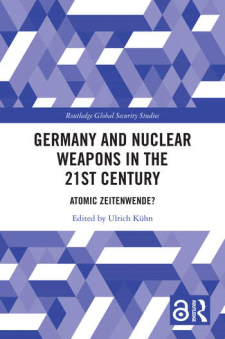June 2024 Books of Note
June 2024

Germany and Nuclear Weapons in the 21st Century: Atomic Zeitenwende?
Ulrich Kühn, ed.
Routledge
2024
The contributors to this collection have produced a valuable introduction to current nuclear debates in Germany, providing foreign readers with a first reference for deciphering recurring allusions to an independent nuclear deterrent in German political circles. Although not a comprehensive history of postwar Germany’s relationship to the bomb, this edited volume provides the context to understand a wide range of contemporary nuclear issues. The volume benefits from an impressive range of viewpoints, with highlights such as Giorgio Franceschini’s chapter explaining shifts in the Green Party’s policy on nuclear weapons and Michal Onderco’s polling of German public opinion.
Editor Ulrich Kühn and co-author Barbara Kunz explain in their chapter that a Franco-German route to a German nuclear weapon is barred by a “lack of strategic convergence” and numerous practical, legal, doctrinal, and cultural challenges. In examining Germany’s decision to give up its own latent potential, Kühn argues that the strategic considerations that led to the abandonment of nuclear technology persist to this day. The book makes clear that stray talk in the Bundestag distracts from the far more substantial and nuanced nuclear debate in Germany on the country’s role in nonproliferation, NATO deterrence, and disarmament.—XIAODON LIANG

Arms Control at a Crossroads: Renewal or Demise?
Jeffrey A. Larsen and Shane Smith, eds.
Lynne Rienner Publishers
2024
With the New Strategic Arms Reduction Treaty expiring in 2026 and the future of arms control uncertain, this edited volume centers on the editors’ assertion that arms control is “not quite” dead and its value as a tool of statecraft remains even if it faces steep challenges ahead. The book presents 16 analyses by respected experts who probe the editors’ view that “arms control will need to adapt to the realities of a new era to remain a relevant instrument of statecraft.” It provides a comprehensive overview of international efforts to rein in nuclear weapons.
The book covers a wide variety of arms control and cooperative security topics, including the theory and contexts of arms control, the perspectives of major powers and their competitive relationships, and the future of arms control in traditional and new domains, such as cyberspace and outer space.
In a world that has grown pessimistic about containing nuclear weapons, the editors acknowledge that arms control has “lost its luster among many of the world’s political leaders.” Yet, they remain hopeful that “political leaders will one day again see the utility and value of arms control as a primary tool for managing competition.”
—SHIZUKA KURAMITSU
